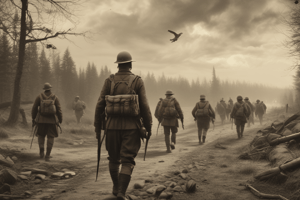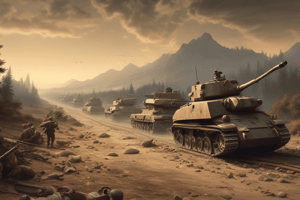Podcast
Questions and Answers
Match the following World War I leaders with their countries:
Match the following World War I leaders with their countries:
Robert Borden = Canada Woodrow Wilson = United States David Lloyd George = United Kingdom Kaiser Wilhelm II = Germany
Match the following World War I terms with their definitions:
Match the following World War I terms with their definitions:
No-Man's-Land = Area between trenches Trench Foot/Mouth = Disease caused by poor conditions Shell Shock = Psychological trauma caused by war War of Attrition = Strategy to wear down the enemy
Match the following World War I events with their descriptions:
Match the following World War I events with their descriptions:
Assassination of Franz Ferdinand = Event that triggered World War I The invasion of Belgium = Event that drew Britain into World War I The Schlieffen Plan = German military strategy The sinking of the Lusitania = Event that drew the United States into World War I
Match the following 1920s and 1930s leaders with their countries:
Match the following 1920s and 1930s leaders with their countries:
Match the following 1920s and 1930s terms with their definitions:
Match the following 1920s and 1930s terms with their definitions:
Match the following World War II leaders with their countries:
Match the following World War II leaders with their countries:
Match the following World War II terms with their definitions:
Match the following World War II terms with their definitions:
Match the following World War II events with their descriptions:
Match the following World War II events with their descriptions:
Match the following Cold War leaders with their countries:
Match the following Cold War leaders with their countries:
Match the following Cold War terms with their definitions:
Match the following Cold War terms with their definitions:
Flashcards are hidden until you start studying
Study Notes
World War One
- Key figures:
- Robert Borden, Billy Bishop, Woodrow Wilson, David Lloyd George, Kaiser Wilhelm II, Czar Nicholas II, George Clemenceau, Archduke Franz Ferdinand, Gavrillo Princip
- Important terms:
- No-Man's-Land, Shrapnel, Artillery, Trench Foot/Mouth, Shell Shock, Enemy Aliens, Conscription, War of Attrition, Propaganda, Total War, Pacifists, Women's Suffrage, Nationalism, Imperialism, Militarism, Alliance Systems, Dog-fights, U-Boats, Convoy System
- Events:
- Assassination of Franz Ferdinand, Austria's Ultimatum, Invasion of Belgium, Schlieffen Plan, Trench Warfare, Alliance Systems
- Battles:
- Ypres, The Somme, Vimy Ridge, Passchendaele, The Sinking of the Lusitania, The Zimmerman Telegram, The War in the Air
The 20's and 30's
- Key figures:
- Rocco Perri, Al Capone, William Lyon Mackenzie King, RB Bennett, Agnes Macphail, Nellie McClung, Adrien Arcand, JS Woodsworth, Maurice Duplessis, William Aberhart, Tim Buck, Franklin Roosevelt, Mary Pickford
- Important terms:
- Prohibition, Bootlegging, Rumrunning, Speakeasy, Living on the Pogey, Relief Camp, Fascism, Communism, Socialism, Social Welfare, National Socialism, Economic Depression, Recession, Boom/Bust cycle, Capitalism, "Buying on credit", Dust Bowl, Temperance, Evangelicalism, Suffrage, Red Scare, Autonomy, Tariffs, Bennett Buggies
- Events:
- Prohibition in Canada, The Jazz Age, Growth of the Automobile industry, Widespread use of the radio, Spin-off industries, Stock Market Crash, Economic Depression, Bennett's New Deal, Relief Camps, The Persons Case, Rise of Unions, On-to-Ottawa Trek, Rise of new political parties, Rise of Fascism in Canada, Rise of Communism in Canada, The Halibut Treaty, The Balfour Report, The Statute of Westminster, The Chanak Affair
World War Two
- Key figures:
- Hitler, Stalin, Mussolini, Franco, Churchill, Chamberlain, Mackenzie King, Franklin Roosevelt, Harry Truman, Emperor Hirohito
- Important terms:
- League of Nations, Fascism, Nazi, Communist, Blitzkrieg, Dictator, Phoney War, Appeasement, Scapegoat, Maginot Line, Anti-Semitism, Conscription, Holocaust, Total War, Internment Camps, War Measures Act, "The Homefront" - Rationing
- Events:
- Invasion of Poland, Miracle of Dunkirk, Battle of Britain, Nazi-Soviet Pact, Dieppe Raid, Italian Campaign, D-Day (Normandy invasion), Pearl Harbor, Hong Kong, War in the Pacific (Okinawa/Iwo Jima), Operation Barbarossa, Liberation of Belgium and Holland, War at Sea and Air- Battle of the Atlantic, Munich Agreement, War Measures Act, Internment of Japanese Canadians, Dropping the A-Bomb (Hiroshima & Nagasaki)
Cold War Era
- Key figures:
- Harry Truman, Winston Churchill, Joseph Stalin, John Diefenbaker, Lester B. Pearson, Pierre Trudeau, Nikita Khrushchev, Rene Levesque, Igor Gouzenko, Viola Desmond, Joey Smallwood, Dwight Eisenhower, Fidel Castro, Ronald Reagan, Mikhail Gorbachev
- Important terms:
- Baby Boom, Suburbia, NATO, United Nations, NORAD, Warsaw Pact, Counter Culture, Iron Curtain, Red Scare, Quiet Revolution, FLQ, Draft Dodger, DEW, Glasnost, Perestroika, Sovereignty-Association
- Events:
- Newfoundland into Confederation, Expo '67, Summit Series, October Crisis, Cuban Missile Crisis, Korean War, Suez Canal Crisis, Vietnam War, Avro Arrow
Studying That Suits You
Use AI to generate personalized quizzes and flashcards to suit your learning preferences.




